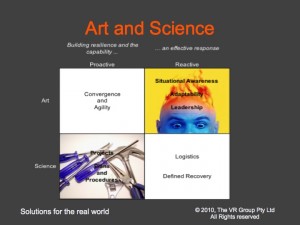
The annual BCI Conference starts in Sydney today, unfortunately I am not able to make it this year – having chosen to go to Toronto later in the month I need to stick to paid activity this week!
I spoke at the BCI conference last year, my session was titled “In Defence of Uncertainty”. It may sound a little strange and even 1 year on that message is still not getting heard a lot.
The theme of last year’s conference was “Resilience over Uncertainty”. My purpose was to clarify that resilience was not the opposite of uncertainty and that, in fact, resilience embraced uncertainty.
Without uncertainty there is going to be little future employment for the Risk and BC folks, so you would think we should be ready and willing to embrace, even promote, uncertainty. But we push back.
Uncertainty is a fact of life, otherwise we would already know the lotto numbers that are going to come up this week and no longer care about the lack of future work in Risk and BCM.
Despite this we still strive to impose certainty and control on our environment and the complex adaptive systems that our societies and value chains have become.
We have been trained and educated to think that policy, procedure and compliance assure us that things are under control. To attack problems by breaking them down and creating ‘elegant solutions’ based on proven ‘Best Practice’ methods.
This form of training and thinking is perhaps what is limiting our ability and willingness to embrace uncertainty.
Uncertainty combined with complex inter-dependence means that some problems are Wicked, and require ‘clumsy’ rather than ‘elegant’ solutions.
Uncertainty can never be managed by a compliance approach. How would you monitor compliance with the required level of Situational Awareness, to be able to detect weak signals of imminent problems in your environment?
Uncertainty is also not bound by what happened in the past, it will set it’s own future. You cannot prepare for that unction future based on what succeeded in the past – and Best Practice is almost always a statement of past practice.
Uncertainty also has an upside, it presents opportunity.
I look forward to seeing the presentations from this year’s conference published.
Hopefully there will be some that address the Art of BCM rather than just the Science.
I am sure a couple of the featured speakers will be addressing this need to embrace uncertainty and the non-traditional thinking that this demands.
More in the next post on one of these non-traditional thinkers.
Do you think that we need to think differently to approach resilience, or just follow the published recipes?
Leave a Reply